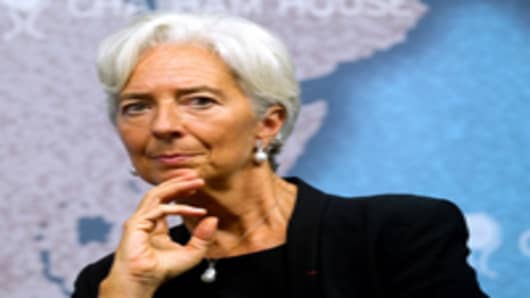The International Monetary Fund needs $500 billion to help contain the spreading European debt crisis, the organization's managing director, Christine Lagarde, told CNBC.
With about $150 billion committed from member countries so far, the IMFis seeking to convince its members that putting together a strong enough fund to block off euro zone contagion is vital for the global economy.
"The ECB has done a lot at the end of 2011, and yet more needs to be done," Lagarde said in a live interview from the World Economic Forumat Davos, Switzerland. "From the IMF point of view, we believe that there should be more growth, a stronger firewall, and deeper integration."
Those goals entail the simultaneous efforts to get European economies to grow their way out of a likely recessionthis year, while at the same time policy makers seek to devise a fund strong enough to protect against sovereign debt default contagion and provide the fiscal policies necessary to prevent similar problems in the future.
That's a tall order for a group like the IMF, which needs to bring together widely disparate needs and goals for countries growing at significantly different levels.
But Lagarde expressed confidence the organization can navigate its way through the minefield.
"The membership at-large is very supportive of the IMF playing the role that it has been assigned to play, that is helping with the stability of the global economy," she said.
Members remain concerned, however, with making sure that the proper steps are taken so the efforts are not in vain, Lagarde said.
"Generally, it has been predicated on the effort that members of the euro zone have to make, whether it's the fiscal compact and its delivery, whether it's improved competitiveness, whether it's with an increased firewall, deeper integration — all of it on a comprehensive basis so that the euro partners themselves demonstrate that they have faith in their collective future," Lagarde said.
The IMF faces the difficult task of being a facilitator for getting Europe out of its debt crisis while not actually playing the role of negotiator.
Yet Lagarde has taken a strong hand in trying not merely to focus on the euro zone, but also on the debt problems around the world — including the U.S., which was the target of some advice for how to handle its own problems.
"The epicenter of the crisis is in the euro zone at the moment, but the euro zone is not the only (region) that needs to face the resolve to address its difficulties," she said. "The United States, for instance, has to look at its deficit forecast, has to change its debt trajectory, and has to end this very sterilized debate about the debt ceiling that produced no significant and long-lasting outcome."



